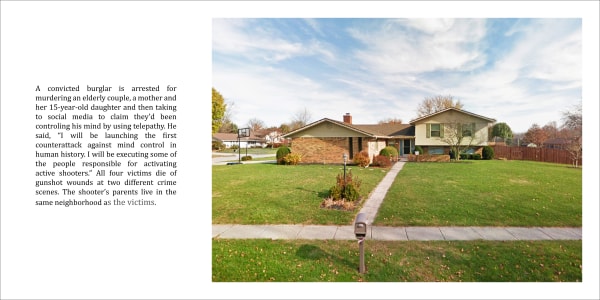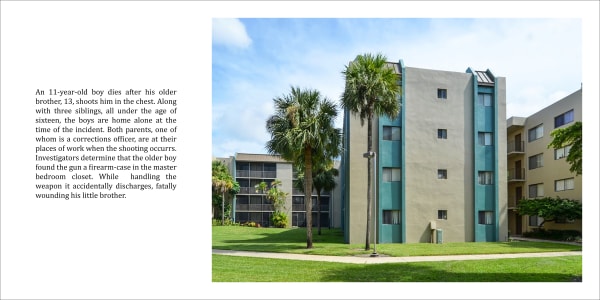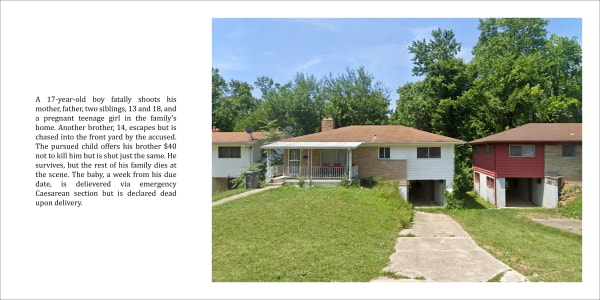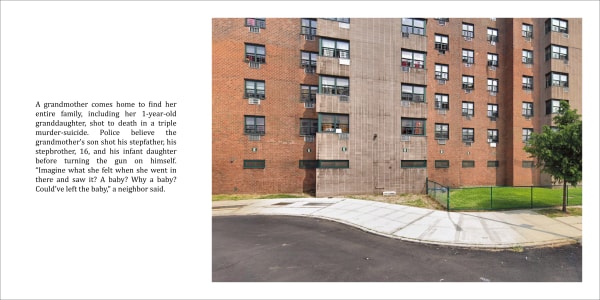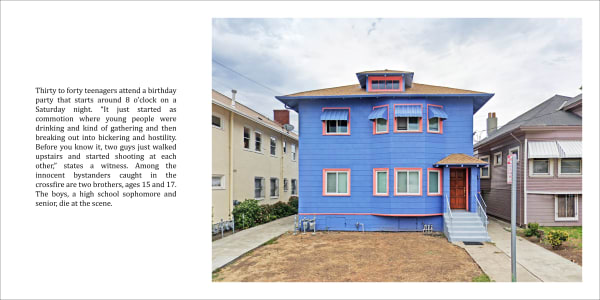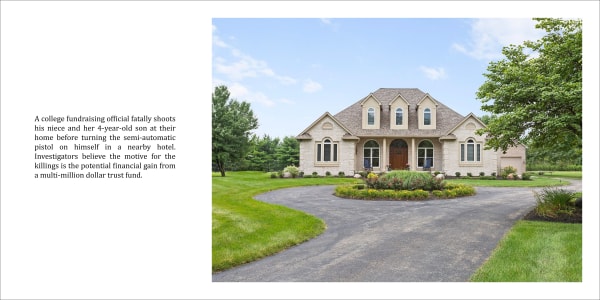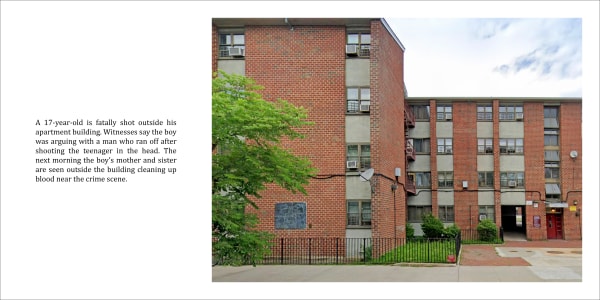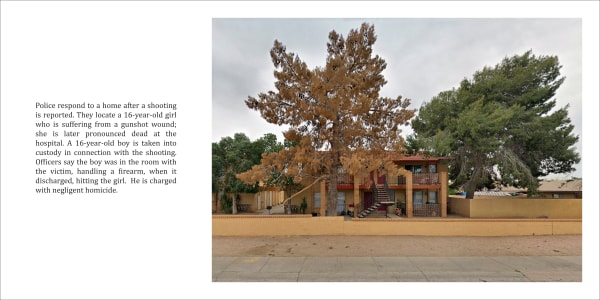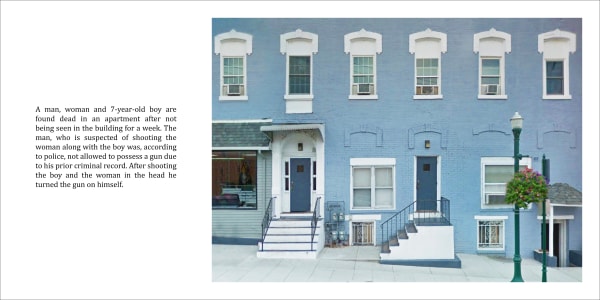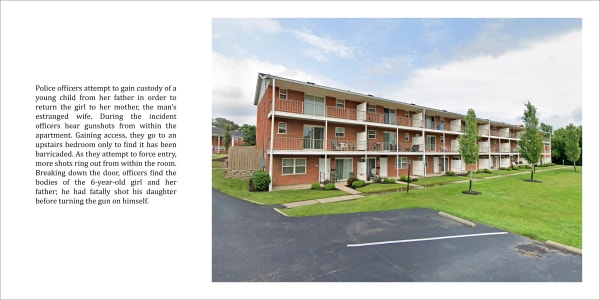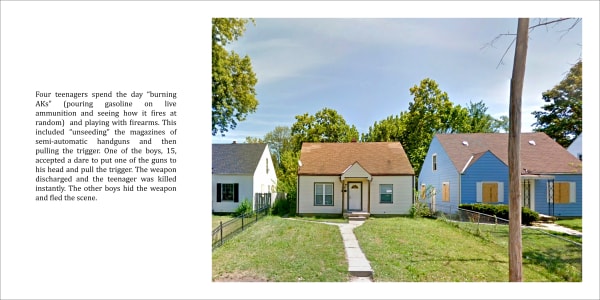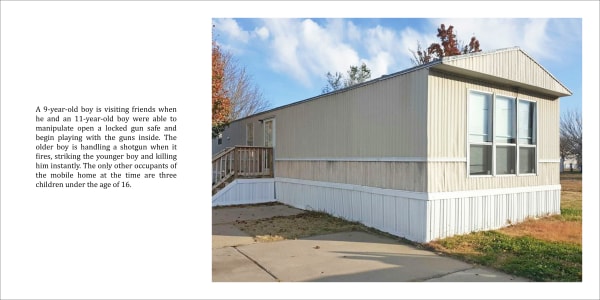-
Horrified by the increase in incidents of children being killed by guns, I have been compelled to address the issue with a stark visual response. Much attention is focused on the victims of mass/school shootings, and rightly so. However, an average of four U.S. children a day are killed by a gun – as a 17-year-old in California is dying, caught in barrage of gang-related gunfire, a 2-year-old girl in Missouri is being shot by her father in a murder-suicide and, simultaneously, an 11-year-old boy in Florida has found a loaded gun in the closet and fatally shoots himself in the face.
How could I portray the anguish and anger these incidents elicit? I made countless attempts to create work that would grab viewers and shake them into action, but everything seemed only to add to the unheeded screams of the times.
So I decided to lower my voice, to whisper. Instead of portraying the victims and their tragic stories I show the houses, parks and streets where the killings will happen in the near future. Guided by gun-violence data I locate each incident address and, via internet imagery, “photograph” the scene, framing the view as if I was standing at the location.
-
In these photographs there are no people, no cars, and no scenes of life, only the specific locations where the child will be killed. At first glance the photos resemble real estate ads or surveyor photos – banal and harmless, a cross-section of where/how Americans live. But when the viewer realizes these images depict a place where in the near future a child will be shot and killed, these houses, apartment buildings, and parks quickly fall into the category of, in the words of Hannah Arendt, “terrifyingly normal.”
As in my other work, by presenting only the place, I am giving viewers the opening sentence, the first paragraph of a haunting narrative that they must complete on their own. But the inescapable fact in this narrative is that at least one child will be killed in each place we are viewing. And that there is a possibility that the victim is alive and well during the moment the house was photographed; playing in his or her room or, perhaps, hiding in that same room from his or her future killer.
I expect viewers to see through these blank windows and visualize the child within -- I am counting on their empathy and imagination. My hope is that by seeing where a preventable death will happen, the viewer may be galvanized to circumvent similar occurrences in the place(s) next door.
— Arne Svenson
-
-

Arne Svenson
Future Passed #1, 2023Pigment Print on Newsprint
17 x 34 in.
Dimensions Variable
Available as sets only
Institutional collections & donations
Digital Display format also available -

Arne Svenson
Future Passed #2, 2023Pigment Print on Newsprint
17 x 34 in.
Dimensions Variable
Available as sets only
Institutional collections & donations
Digital Display format also available -

Arne Svenson
Future Passed #3, 2023Pigment Print on Newsprint
17 x 34 in.
Dimensions Variable
Available as sets only
Institutional collections & donations
Digital Display format also available -

Arne Svenson
Future Passed #4, 2023Pigment Print on Newsprint
17 x 34 in.
Dimensions Variable
Available as sets only
Institutional collections & donations
Digital Display format also available -

Arne Svenson
Future Passed #5, 2023Pigment Print on Newsprint
17 x 34 in.
Dimensions Variable
Available as sets only
Institutional collections & donations
Digital Display format also available -

Arne Svenson
Future Passed #6, 2023Pigment Print on Newsprint
17 x 34 in.
Dimensions Variable
Available as sets only
Institutional collections & donations
Digital Display format also available -

Arne Svenson
Future Passed #7, 2023Pigment Print on Newsprint
17 x 34 in.
Dimensions Variable
Available as sets only
Institutional collections & donations
Digital Display format also available -

Arne Svenson
Future Passed #8, 2023Pigment Print on Newsprint
17 x 34 in.
Dimensions Variable
Available as sets only
Institutional collections & donations
Digital Display format also available -

Arne Svenson
Future Passed #9, 2023Pigment Print on Newsprint
17 x 34 in.
Dimensions Variable
Available as sets only
Institutional collections & donations
Digital Display format also available -

Arne Svenson
Future Passed #10, 2023Pigment Print on Newsprint
17 x 34 in.
Dimensions Variable
Available as sets only
Institutional collections & donations
Digital Display format also available -

Arne Svenson
Future Passed #11, 2023Pigment Print on Newsprint
17 x 34 in.
Dimensions Variable
Available as sets only
Institutional collections & donations
Digital Display format also available -

Arne Svenson
Future Passed #12, 2023Pigment Print on Newsprint
17 x 34 in.
Dimensions Variable
Available as sets only
Institutional collections & donations
Digital Display format also available -

Arne Svenson
Future Passed #13, 2023Pigment Print on Newsprint
17 x 34 in.
Dimensions Variable
Available as sets only
Institutional collections & donations
Digital Display format also available -

Arne Svenson
Future Passed #14, 2023Pigment Print on Newsprint
17 x 34 in.
Dimensions Variable
Available as sets only
Institutional collections & donations
Digital Display format also available -

Arne Svenson
Future Passed #15, 2023Pigment Print on Newsprint
17 x 34 in.
Dimensions Variable
Available as sets only
Institutional collections & donations
Digital Display format also available -

Arne Svenson
Future Passed #16, 2023Pigment Print on Newsprint
17 x 34 in.
Dimensions Variable
Available as sets only
Institutional collections & donations
Digital Display format also available -

Arne Svenson
Future Passed #17, 2023Pigment Print on Newsprint
17 x 34 in.
Dimensions Variable
Available as sets only
Institutional collections & donations
Digital Display format also available -

Arne Svenson
Future Passed #18, 2023Pigment Print on Newsprint
17 x 34 in.
Dimensions Variable
Available as sets only
Institutional collections & donations
Digital Display format also available -

Arne Svenson
Future Passed #19, 2023Pigment Print on Newsprint
17 x 34 in.
Dimensions Variable
Available as sets only
Institutional collections & donations
Digital Display format also available -

Arne Svenson
Future Passed #20, 2023Pigment Print on Newsprint
17 x 34 in.
Dimensions Variable
Available as sets only
Institutional collections & donations
Digital Display format also available -

Arne Svenson
Future Passed #21, 2023Pigment Print on Newsprint
17 x 34 in.
Dimensions Variable
Available as sets only
Institutional collections & donations
Digital Display format also available -

Arne Svenson
Future Passed #22, 2023Pigment Print on Newsprint
17 x 34 in.
Dimensions Variable
Available as sets only
Institutional collections & donations
Digital Display format also available -

Arne Svenson
Future Passed #23, 2023Pigment Print on Newsprint
17 x 34 in.
Dimensions Variable
Available as sets only
Institutional collections & donations
Digital Display format also available -

Arne Svenson
Future Passed #24, 2023Pigment Print on Newsprint
17 x 34 in.
Dimensions Variable
Available as sets only
Institutional collections & donations
Digital Display format also available -

Arne Svenson
Future Passed #25, 2023Pigment Print on Newsprint
17 x 34 in.
Dimensions Variable
Available as sets only
Institutional collections & donations
Digital Display format also available -

Arne Svenson
Future Passed #26, 2023Pigment Print on Newsprint
17 x 34 in.
Dimensions Variable
Available as sets only
Institutional collections & donations
Digital Display format also available -

Arne Svenson
Future Passed #27, 2023Pigment Print on Newsprint
17 x 34 in.
Dimensions Variable
Available as sets only
Institutional collections & donations
Digital Display format also available -

Arne Svenson
Future Passed #28, 2023Pigment Print on Newsprint
17 x 34 in.
Dimensions Variable
Available as sets only
Institutional collections & donations
Digital Display format also available -

Arne Svenson
Future Passed #29, 2023Pigment Print on Newsprint
17 x 34 in.
Dimensions Variable
Available as sets only
Institutional collections & donations
Digital Display format also available -

Arne Svenson
Future Passed #30, 2023Pigment Print on Newsprint
17 x 34 in.
Dimensions Variable
Available as sets only
Institutional collections & donations
Digital Display format also available -

Arne Svenson
Future Passed #31, 2023Pigment Print on Newsprint
17 x 34 in.
Dimensions Variable
Available as sets only
Institutional collections & donations
Digital Display format also available -

Arne Svenson
Future Passed #32, 2023Pigment Print on Newsprint
17 x 34 in.
Dimensions Variable
Available as sets only
Institutional collections & donations
Digital Display format also available -

Arne Svenson
Future Passed #33, 2023Pigment Print on Newsprint
17 x 34 in.
Dimensions Variable
Available as sets only
Institutional collections & donations
Digital Display format also available -

Arne Svenson
Future Passed #34, 2023Pigment Print on Newsprint
17 x 34 in.
Dimensions Variable
Available as sets only
Institutional collections & donations
Digital Display format also available -

Arne Svenson
Future Passed #35, 2023Pigment Print on Newsprint
17 x 34 in.
Dimensions Variable
Available as sets only
Institutional collections & donations
Digital Display format also available
-


